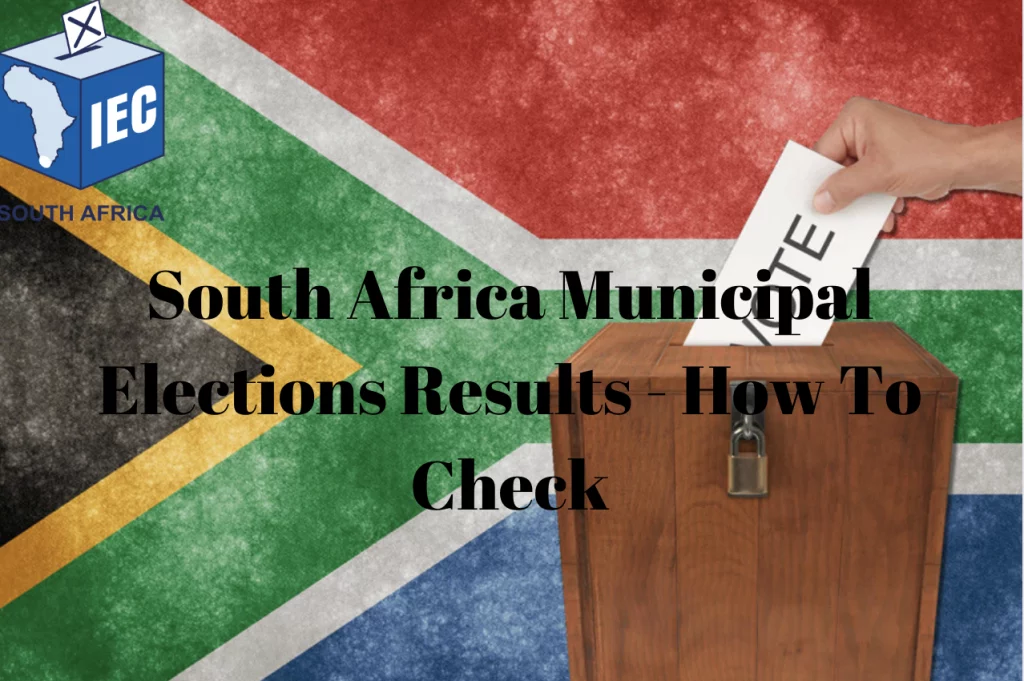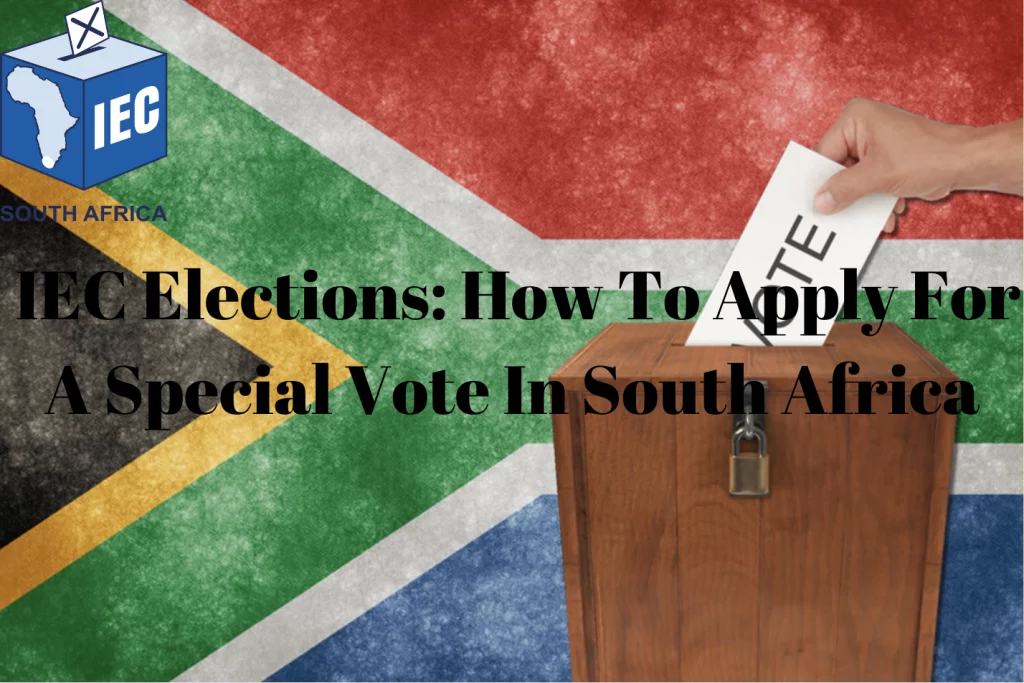South African Municipal Elections – Municipal elections are critical occasions in South African democracy, where the collective voice of communities reverberates through the corridors of administration. These municipal elections serve as a cornerstone in the foundation of the nation’s democratic process, allowing residents to actively affect the trajectory of their immediate surroundings.
Municipal elections are important not just for electing local officials, but also for influencing laws and choices that affect daily life. These elections enable citizens to actively engage in developing resilient, dynamic, and inclusive municipalities, from the supply of basic services to the creation of community infrastructure.
Purpose of Municipal Elections
Municipal elections in South Africa serve multiple purposes, reflecting the greater aims of democratic governance and community participation at the municipal level. The relevance of these elections stems from their role in influencing local administration, policies, and development projects. The following are the primary goals of Municipal Elections in South Africa:
- local elections are held to elect representatives to local councils. Mayors, councillors, and other local leaders, among others, become the voices of their communities, advocating for local needs and concerns.
- Municipalities are important players in local development because they manage services such as water supply, sanitation, housing, and infrastructure. Citizens vote in Municipal Elections to elect officials who will make decisions that directly affect the development and well-being of their communities.
- Elected municipal officials are in charge of managing resource allocation and the creation of local budgets. Municipal elections have an impact on how financial resources are dispersed among various community services and initiatives.
- Municipal elections promote strong civic engagement and community participation in the democratic process. Citizens contribute to the selection of leaders who will solve local concerns, promote community interests, and build a feeling of shared responsibility via voting.
- Municipal councils oversee developing and executing policies that address local issues. Elected officials work with community people to craft policies that address the specific requirements of their municipality.
- Municipal leaders are held accountable for their actions and choices by voters through frequent elections. The democratic process fosters transparency in governance, establishing a system in which leaders are accountable to the voters.
- Municipal elections help to the formation of diverse and inclusive local leadership. Municipal Elections attempt to showcase the diversity of communities by allowing individuals of all backgrounds to run for office.
- Municipal elections serve as a basis for developing and maintaining democratic values at the grassroots level. They give a venue for citizens to exercise their democratic rights and contribute to South Africa’s larger democratic fabric.
Who Can Vote In Municipal Elections
- Individuals must be South African citizens to vote in Municipal Elections. This includes citizens via birth or naturalization.
- Individuals must be registered voters to vote in Municipal Elections. Voter registration is usually done regularly, and eligible persons must register to be placed on the voters’ roll.
- On the day of the election, eligible voters must be 18 years old or older. South African nationals who turn 18 by the polling day are entitled to register and vote.
- Residents of the municipality in which they intend to vote are required to vote. The municipality is the local government region where people live and vote in local elections.
- Individuals who are not barred from voting by law are eligible. Being adjudicated mentally incompetent by a court, serving a prison sentence without the option of a fine, or being an unrehabilitated insolvent are all grounds for disqualification.
- South African individuals are not allowed to vote in more than one voting district during general elections. This means that voters must select a voting district within their municipality of registration.
In simple words, be a South African national. On election day, you must be 18 years old or older. Have a South African with a green barcode. or a smart identification card; Be on the voter registration list; You must register your residence.
Which Date Will Municipal Elections Take Place
The Independent Electoral Commission (IEC) sets election dates, which can change. The IEC normally announces the timing of municipal elections closer to the election year. I recommend consulting the official website of the Independent Electoral Commission (IEC) or referring to official announcements from the IEC to acquire the most current and up-to-date information on the date of Municipal Elections in South Africa. Election dates are subject to change, and the IEC is the primary source for the most up-to-date information on electoral calendars.
How To Register For Municipal Elections
- Make sure you match the eligibility requirements, which include being a South African citizen, being 18 years or older, and dwelling in the municipality where you want to vote.
- Check to see whether you’re already registered to vote. You can verify your registration status on the Independent Electoral Commission (IEC) website or by visiting your local IEC office.
- If you are not yet registered, you must go to your nearest IEC office during the voter registration period.
- During various registration periods, the IEC establishes registration stations throughout the country. Determine the location of the nearest IEC office or registration station in your municipality.
- Bring identification documents with you when you go to the register. A South African identity document (ID) or a valid South African passport is usually required.
- You must fill out a registration form at the registration desk. Provide accurate information, such as your name, address, and other pertinent information.
- The IEC uses biometric technology for voter registration. During the registration procedure, your fingerprints and a photo will be taken.
- After completing the registration process, you will be issued a temporary registration certificate. Keep this document secure as it may be required for voting.
- Check the information on your temporary registration certificate to guarantee its accuracy. If there are any inaccuracies, tell the registration authority so that they can be corrected.
- Municipalities usually announce special voter registration periods well in advance of elections. Check the IEC website, local news, or official notifications for forthcoming registration periods.
- Depending on the election cycle and available technology, the IEC may offer online voter registration. For more information on online registration, visit the IEC website.
- For the most accurate and up-to-date information on voter registration for Municipal Elections in South Africa, always consult the Independent Electoral Commission’s official announcements and instructions.
How To Check Municipal Elections Registration Status
- Navigate to the Independent Electoral Commission of South Africa’s (IEC) official website. The address of the website is https://www.elections.org.za/.
- Find a section of the website dedicated to voter services or voter information. The exact wording may differ, but it usually incorporates voter services.
- There should be a check your registration status option inside the voter services area. Select this option by clicking it.
- You might be asked to input personal information like your ID number or other details. To give the requested information, follow the instructions on the website.
- Submit your request after filling in the essential information. The system should then display your registration status, indicating whether or not you are registered to vote and, if so, the location of your voting station.
- Registration status may be especially important during voter registration periods running up to elections. During these times, the IEC may actively encourage people to review and update their registration information.
- If you have any problems or would rather not check online, you can contact the IEC directly for help. They may provide registration status information over the phone or via email.
- If online choices are unavailable or you prefer in-person support, you can go to your nearest IEC office. They can check your registration status and assist you if needed.
Additionally, Enter your ID number below to find out your registration status, voting station, and ward information.
How To Check Your Registration Details Online?
To check your registration details online, click on this link https://registertovote.elections.org.za/Welcome
What Happens On The Day Of South African Municipal Election
Several key actions and processes take place on the day of a South African Municipal Election. Here’s a summary of what usually happens:
- On Election Day, polling places throughout the municipality open early in the morning. These polling locations are deliberately placed to provide eligible people easy access to vote.
- Voters must produce identification documents (ID or valid passport) when they arrive at the voting station. Election authorities cross-check the voter’s information against the voter’s roll.
- Once validated, voters are given the relevant ballot papers. Municipal elections often involve voting for local representatives such as councilors and mayors.
- Voters enter a private booth to mark their ballots. The confidentiality of the vote is critical to ensure that individuals can freely express their choices without external influence.
- Voters then place their completed ballot papers into a sealed ballot box after marking their preferences. This safeguards the voting process’s confidentiality and integrity.
- After voting in some elections, voters’ fingertips may be inked with permanent ink. This helps to prevent repeated votes from being cast by the same person.
- Local and international election observers may be present at polling places to examine the process for fairness, openness, and adherence to electoral regulations.
- Depending on the schedule established by the Independent Electoral Commission (IEC), voting locations close in the late afternoon or evening. After the official closure time, no one is allowed to join the queue.
- After the polls close, the counting of votes begins. Counting is usually done at polling places, with the results being recorded and signed by election officials.
- Each voting station’s results are relayed to a central location, where they are counted. This procedure contributes to the election’s overall outcome.
- The Municipal Election results are announced by the Independent Electoral Commission (IEC). This covers the names of elected officials as well as the distribution of municipal council seats.
- Following the election, there may be procedures in place to resolve any issues or challenges to the election results. As elected politicians begin their tenure, the focus switches to the work of local government.


